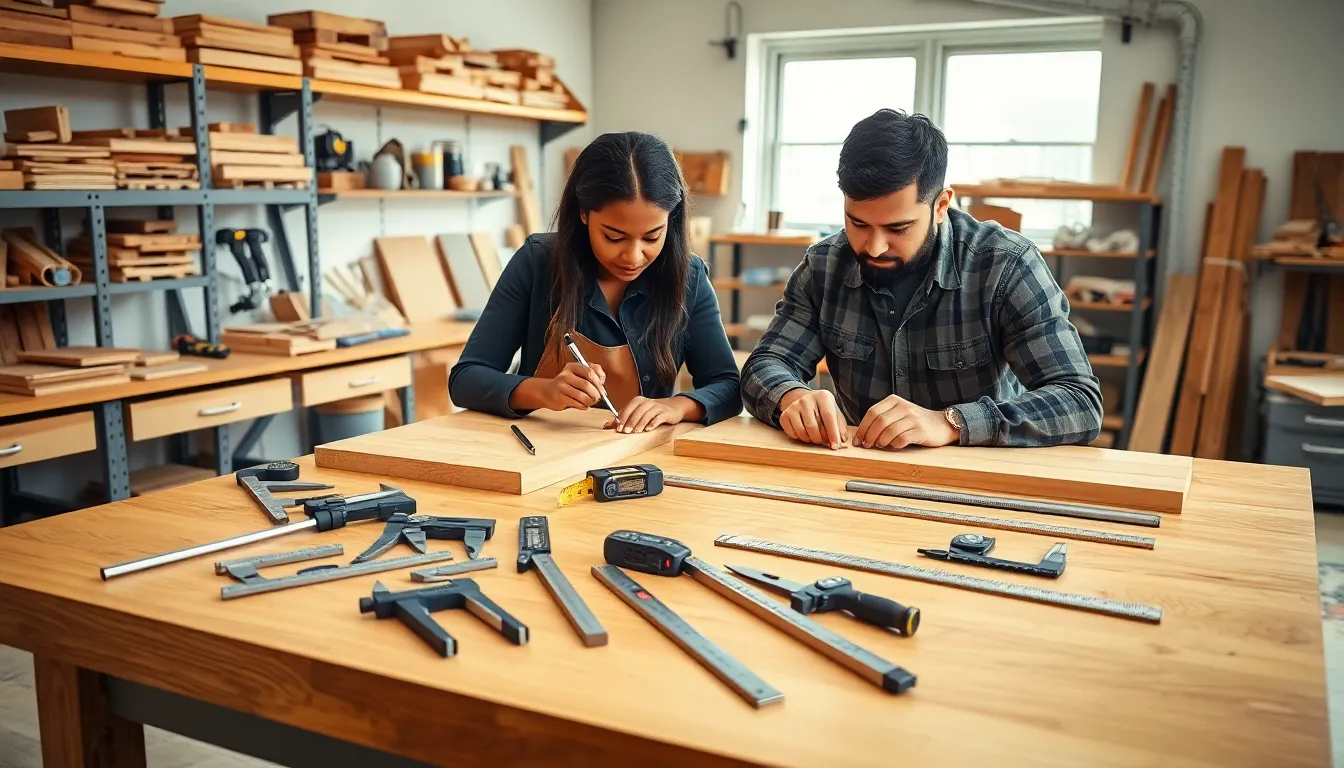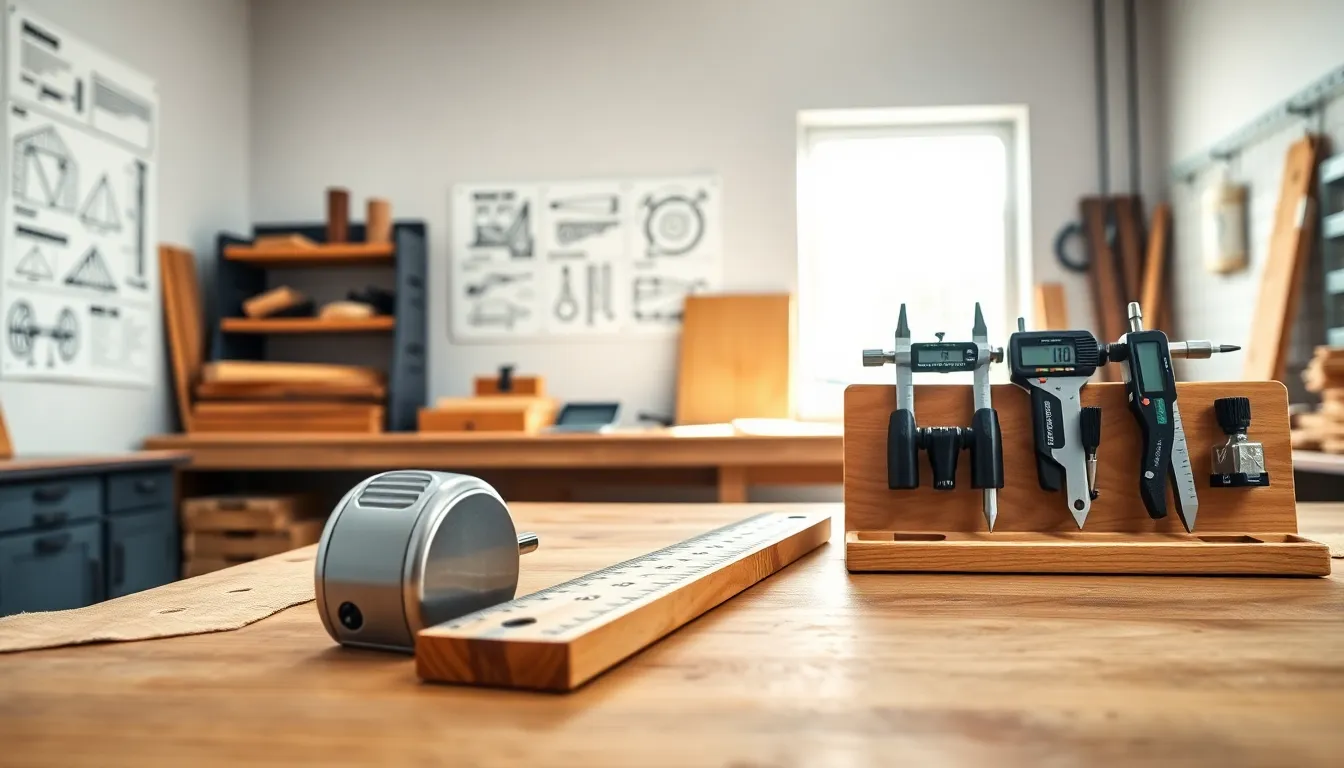In a world where getting measurements right can mean the difference between a masterpiece and a mishap, the significance of accurate measuring tools in a workshop cannot be overstated. Imagine cutting a piece of wood only to discover it’s too short for your project. Oops. Or, striving to build the perfect shelf and realizing it leans like the Tower of Pisa. Awkward. That’s where the right tools come into play. This guide explores the wealth of measuring tools available, ensuring that your workshop doesn’t just thrive, but shines. Grab your toolkit, and let’s hit the ground running with precision.
Table of Contents
ToggleImportance of Accurate Measurements

Accurate measurements are the cornerstone of any successful project. They ensure that components fit together perfectly and that the final product meets expectations. Whether it’s carpentry, metalworking, or crafting, errors can lead to wasted materials, time, and even money. But the consequences stretch beyond the tangible, imagine the frustration of completing a project only to find out it’s not quite right. Proper measurements build confidence in the work, leading to better outcomes and greater satisfaction. In other words, when it comes to measuring, cutting corners can cut results.
Types of Measuring Tools
Understanding the various types of measuring tools available can empower anyone in the workshop to make informed choices when it comes to precision.
1. Rulers and Tape Measures
Rulers and tape measures are the bread and butter of measurements. Rulers, typically made of wood or metal, provide straightforward, linear measurements. Tape measures offer greater flexibility, extending several feet. Both tools are essential for marking and sizing materials accurately.
2. Calipers
Calipers excel in measuring internal and external dimensions with impressive accuracy. They come in digital, dial, and vernier forms, with digital calipers being the easiest to read. They define precision, ideal for tasks demanding attention to detail.
3. Squares
Squares are all about right angles. They help verify the squareness of corners, ensuring perfectly straight cuts and joints. Having a reliable square in the workshop means never settling for less than absolute alignment.
4. Levels
Levels assist in determining how level a surface is. Whether hanging shelves or constructing frames, a good level prevents unsightly angles from becoming the norm. This tool helps keep projects balanced and professional-looking.
5. Micrometers
Micrometers take precision a step further. Useful for measuring very small distances, they are indispensable in metalworking and engineering. A micrometer can measure with precision up to a thousandth of a millimeter, perfect for complex tasks.
How to Choose the Right Measuring Tool
Choosing the right measuring tool depends on the specific requirements of a project. Consider the material being measured, wood, metal, or plastic, and the level of precision needed. For large, straightforward tasks, a tape measure suffices. But, intricate tasks often require calipers or micrometers. Also, factor in the environment: working outdoors may necessitate more durable tools. Finally, personal comfort matters. A tool that feels good in the hand boosts efficiency and confidence.
Tips for Proper Measuring Techniques
Proper measuring techniques can greatly enhance the accuracy of any project. Here are some practical tips:
- Always Double-Check: Measure twice, cut once. This age-old saying holds true, take the time to verify measurements before proceeding.
- Keep Tools Clean: Dust and debris can affect accuracy. Regularly clean measuring tools to maintain precision.
- Use a Consistent Method: Develop a routine for measuring to reduce variability. Consistency contributes to accurate and repeatable measurements.
- Mark Measurements Clearly: Use a fine pencil or marking tool to delineate measurements on your materials. Clear markings lead to better execution of cuts or assemblies.
- Don’t Rush: Precision takes time. Avoid the temptation to hurry through measurements: a little patience goes a long way.
Maintaining Your Measuring Tools
Maintaining measuring tools is crucial for longevity and accuracy. Treat them with care. Store them in protective cases to avoid damage. Check calibration regularly, especially for tools requiring precision like calipers and micrometers. For rulers and tape measures, keep them free of bends and kinks. A little thoughtfulness can save money and enhance performance in the long run.



